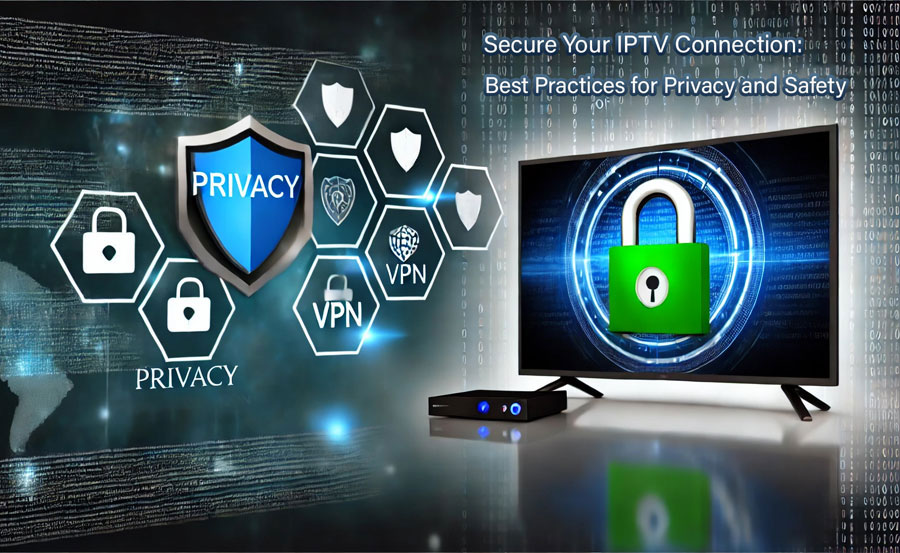In the digital age, where IPTV (Internet Protocol Television) has revolutionized the way we consume entertainment, security and privacy have become significant concerns for users. With IPTV services providing access to thousands of live channels, on-demand content, and more, ensuring your connection is safe and private is crucial. IPTV, while highly convenient, can also expose users to potential security risks if not managed correctly. This article will walk you through the best practices to secure your IPTV connection, ensuring you enjoy uninterrupted entertainment while keeping your data and privacy safe.
Get Instant IPTV Access – Buy Now
Why Is IPTV Security Important?
As IPTV relies on the internet for delivering content, the same threats that plague other online services apply here as well. Without proper security measures in place, you may expose yourself to various risks, such as:
- Data Theft: Cybercriminals can intercept your connection to steal personal information like login credentials or even financial details if you’re using online payment methods.
- Surveillance: Without securing your IPTV connection, you may be vulnerable to unauthorized monitoring of your online activities, which compromises your privacy.
- Malware and Viruses: Downloading apps from unverified sources or connecting to untrusted IPTV providers can expose your device to malware or viruses.
- Legal Issues: Some IPTV services may operate in a legal grey area. Using such services without taking the necessary privacy precautions can put you at risk of fines or legal action.
To avoid these risks, it’s essential to take proactive steps to secure your IPTV experience. Below are the key practices that will help ensure your privacy and safety.
Cloud DVR and IPTV: How to Record and Save Your Favorite Shows
1. Use a VPN (Virtual Private Network)
One of the most effective ways to secure your IPTV connection is by using a Virtual Private Network (VPN). A VPN encrypts your internet traffic, making it nearly impossible for anyone (including hackers, your ISP, or government agencies) to intercept or monitor your data. This is particularly important if you’re using an IPTV service that may fall into a legal grey area.
Here’s how a VPN enhances your IPTV security:
- IP Address Masking: A VPN masks your real IP address, making it difficult for websites, hackers, or any other third parties to track your online activities.
- Encryption: VPNs use strong encryption protocols that scramble your data, ensuring no one can intercept or decrypt it.
- Bypass Geo-Restrictions: If your IPTV service is region-locked or blocked in certain countries, a VPN allows you to bypass these restrictions by connecting to servers in different locations.
When choosing a VPN, look for providers that offer no-log policies, meaning they don’t track or store your browsing activity, ensuring full privacy. Popular and trusted VPN services for IPTV include ExpressVPN, NordVPN, and CyberGhost.
2. Choose a Reputable IPTV Provider
Not all IPTV services are created equal. Some are perfectly legitimate and safe, while others operate on the fringes of legality and may expose you to security risks. It’s essential to research and select a reputable IPTV provider that adheres to proper licensing and security standards.
Here’s what you should consider:
- Check for Encryption: Ensure that the IPTV service uses secure HTTPS protocols to protect your data during transmission.
- Read Reviews: Look for user reviews and ratings to get a sense of the provider’s reputation. Avoid services that have a history of downtime, privacy issues, or poor customer support.
- Customer Support: A good IPTV provider should offer reliable customer support that can assist with any security-related issues you may face.
3. Keep Your IPTV Apps and Devices Updated
Keeping your IPTV apps and devices up-to-date is a crucial step in maintaining security. Software updates often include patches for security vulnerabilities that hackers could exploit. Whether you’re using an Android TV, Firestick, or smart TV, make sure that your device’s operating system and the IPTV apps you use are updated regularly.
4. Avoid Free IPTV Services
Free IPTV services may seem tempting, but they often come with significant security risks. Many free services lack proper encryption and may be funded by intrusive ads or malware. Additionally, free IPTV services can compromise your privacy by collecting and selling your data to third parties. Instead, invest in a reliable, paid IPTV service that takes security seriously and offers a better user experience.
5. Enable Two-Factor Authentication (2FA)
If your IPTV service offers Two-Factor Authentication (2FA), enable it immediately. 2FA adds an extra layer of security by requiring you to provide a second form of verification (like a code sent to your mobile device) in addition to your password. This reduces the risk of unauthorized access, even if someone gets hold of your login credentials.
6. Use Strong, Unique Passwords
It may seem basic, but using strong and unique passwords is a fundamental practice for securing your IPTV account. Weak or easily guessable passwords make it simple for hackers to gain access to your account. Follow these best practices for password security:
- Use a mix of upper and lowercase letters, numbers, and symbols.
- Avoid using the same password across multiple platforms.
- Consider using a password manager to generate and store complex passwords securely.
7. Be Wary of Third-Party Add-Ons
Many IPTV services, especially on platforms like Kodi, allow the use of third-party add-ons. While these can enhance your IPTV experience, they also pose significant security risks. Some add-ons may come from unverified sources, making them a potential entry point for malware or phishing attacks. Only install add-ons from reputable sources, and regularly check for updates or security advisories.
8. Secure Your Home Network
Your IPTV connection is only as secure as your home network. To ensure your network is protected, follow these steps:
- Change Default Router Settings: Most routers come with default login credentials that hackers can easily find online. Change these default settings to a unique username and password.
- Enable Firewall: Ensure your router’s firewall is enabled to block unauthorized access.
- Use WPA3 Encryption: Make sure your Wi-Fi is secured with WPA3 encryption (or WPA2 if WPA3 is not available) to protect against unauthorized access to your network.
9. Monitor Your IPTV Usage
Keep an eye on your IPTV activity and the devices connected to your account. If you notice any unusual behavior, such as unknown devices accessing your IPTV service or unexplained charges, take immediate action. Change your passwords, enable 2FA, and reach out to your IPTV provider’s customer support.
10. Stay Educated on Security Trends
The world of cybersecurity is constantly evolving, and new threats emerge regularly. Stay informed about the latest security trends and potential vulnerabilities that could affect your IPTV experience. Follow cybersecurity blogs, forums, or newsletters to ensure you’re up-to-date on best practices for online safety.
IPTV offers incredible convenience and access to entertainment, but it’s essential to take the necessary steps to protect your connection and data. By using a VPN, selecting reputable providers, enabling 2FA, and following the security best practices outlined above, you can enjoy a seamless and secure IPTV experience without worrying about privacy or safety concerns.
Always remember: protecting your data online is not a one-time task but an ongoing effort. Stay vigilant, keep your software updated, and be cautious about where and how you access IPTV services. With the right precautions in place, you can enjoy IPTV with peace of mind.
Decoding IPTV Protocols: How Does Your Stream Reach You?


